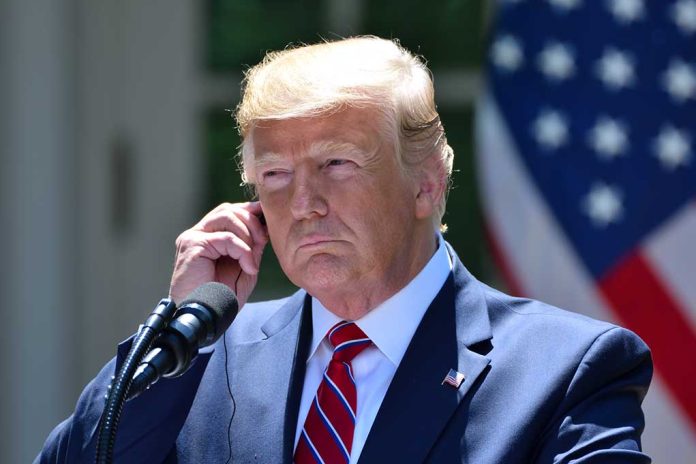
President Trump has signed an executive order implementing a “Most Favored Nation” policy that could slash prescription drug prices by 30-80%, forcing pharmaceutical companies to offer Americans the same lowest prices paid by other developed nations.
Key Takeaways
- Trump’s executive order requires Medicare to pay the same lowest prices for medications as other developed countries, potentially reducing some drug costs by 50-90%.
- The policy primarily targets expensive medications administered in doctors’ offices under Medicare Part B, such as cancer treatments and injectables.
- The U.S. currently funds approximately 75% of global pharmaceutical profits despite having less than 5% of the world’s population.
- Health Secretary Robert F. Kennedy Jr. strongly supports the measure, calling pharmaceutical pricing a major impediment to healthcare access.
- The pharmaceutical industry is expected to strongly oppose the measures, arguing they could harm innovation and research funding.
America First Drug Pricing Strategy
President Donald Trump signed an executive order titled “DELIVERING MOST-FAVORED-NATION PRESCRIPTION DRUG PRICING TO AMERICAN PATIENTS” aimed at dramatically lowering prescription drug costs for Americans. The policy fundamentally changes how drug prices are set in the United States by requiring pharmaceutical companies to offer Americans the same lowest prices paid by other economically developed nations. This approach could reduce prices for some medications by 50-90%, according to White House estimates.
The executive order specifically targets the high-cost medications administered in doctors’ offices and covered under Medicare Part B, which accounted for over $33 billion in spending in 2021. These include expensive cancer treatments and injectable medications that have been subject to substantial price inflation. Trump has criticized the current system for allowing pharmaceutical companies to charge Americans significantly more than consumers in other countries for identical medications.
Americans pay three times more for prescription drugs than patients in other wealthy countries. That ends now.
Today, President Trump signed an Executive Order to demand Most-Favored-Nation pricing — no more gouging Americans to subsidize foreign governments.
I stand with… pic.twitter.com/FuZQcDG6cR
— Secretary Kennedy (@SecKennedy) May 12, 2025
Ending Global Price Disparities
A central argument for the executive order is that Americans have been subsidizing lower drug prices in other countries for decades. The policy aims to end what Trump called an unfair practice where the United States pays substantially higher prices than other developed nations despite funding much of the research and development for these medications. According to statements made during the signing, the U.S. funds approximately three-quarters of global pharmaceutical profits despite having less than 5% of the world’s population.
The executive order directs the Secretary of Health and Human Services to establish mechanisms for Americans to purchase drugs directly from manufacturers at the “Most-Favored-Nation” price. If manufacturers refuse to comply, the Secretary is authorized to propose rules and take measures to reduce drug costs and end anticompetitive practices that have kept prices artificially high for American consumers.
Industry Opposition and Implementation Challenges
The pharmaceutical industry is expected to mount significant opposition to the executive order, arguing that price controls could harm innovation and reduce funds available for research and development of new medications. Similar initiatives by Trump during his first administration were blocked through court challenges on procedural grounds. The Biden administration subsequently abandoned these proposals in 2022, citing court orders and stakeholder concerns about potential negative impacts on pharmaceutical research.
Health and Human Services Secretary Robert F. Kennedy Jr., who joined Trump for the signing ceremony, praised the president’s willingness to challenge the pharmaceutical industry. The White House has indicated it is preparing strategies to address potential pharmaceutical company workarounds and ensure fair market practices internationally. Administration officials emphasized that the program would not affect most common prescription drugs filled at retail pharmacies, which are covered under different Medicare provisions.
Economic Impact and Consumer Relief
The executive order is projected to provide significant savings for both the federal government and individual consumers, though precise estimates vary. Medicare Part B spending on medications has increased substantially over recent years, reaching $33 billion in 2021, with Americans typically paying much more than consumers in other developed nations for identical medications. The administration argues that addressing this price disparity will make essential medications more accessible to millions of Americans who currently struggle with high prescription costs.
Implementation will require significant regulatory changes and is likely to face both legal and procedural hurdles. The executive order instructs the Department of Health and Human Services to develop enforcement mechanisms and address potential industry resistance. The administration has emphasized that these changes aim to ensure Americans no longer pay disproportionately high prices that effectively subsidize healthcare systems in other developed nations.
Sources:
Trump ordering U.S. to pay only the price other nations do for some drugs
Trump executive order demands pharma industry price cuts
Trump Signs EO Dramatically Lowering Prescription Drug Prices







